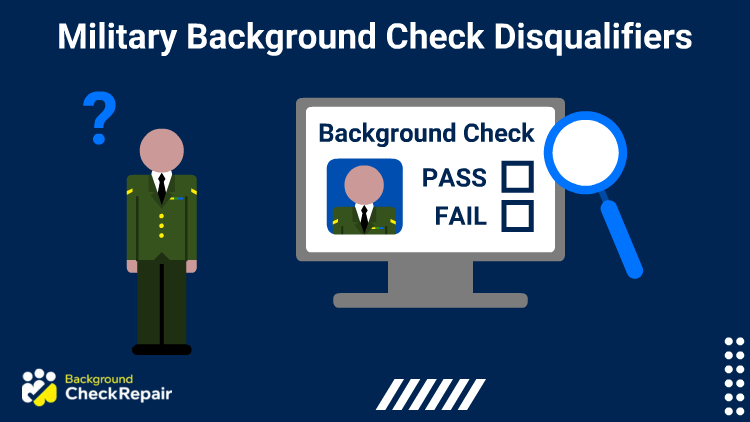
Anyone with a criminal record who is interested in enlisting in the armed forces may wonder what is on the list of military background check disqualifier and waiver rules.
Although most individuals are able to pass an armed forces background, anyone considering enlisting should know the 12 military background check disqualifiers and military waiver rules.
Knowing these will allow individuals to better understand their chances of passing a military background check.
Armed with that information, you can perform a background check on yourself to see if any of the military background check disqualifers show up, and whether or not you need to apply for a waiver.
Top 12 Military Background Check Disqualifiers
The list of exact requirements to join the military is fairly extensive,1 however there are some aspects that are more common disqualifiers than others.
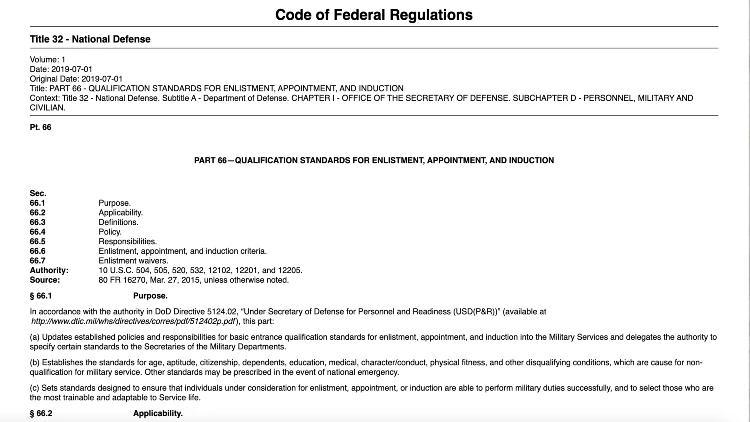
(Image: Department of Defense1)
- Age – MIlitary applicants must be between the ages of 17 and 42 in order to enlist.
- High School Diploma – Although a diploma is not actually required, individuals who do not have a diploma will have a higher minimum score on the Armed Forces Qualification Test (AFQT) in order to be eligible for enlistment, compared to those with high school diplomas.
- Aptitude Score – Individuals who score a category V on the AFQT will not be eligible to enlist.
- Medical Standards – There is an extensive list of medical conditions that would prevent enlistment in the armed forces.
- Physical Standards – individuals must meet certain height and weight standards in order to enlist.
- Dependency Status – individuals with dependents under the age of 18 may be denied enlistment. Married individuals with more than two dependents under the age of 18 and unmarried individuals with one dependent under the age of 18 will require a waiver in order to enlist.
- Judicial restraint – individuals who are currently incarcerated, on probation, on bond, or on parole will not be eligible.
- Felony Convictions – individuals with felony convictions will not normally be able to enlist, however, it is possible to get a waiver for certain crimes.
- Other Felony Convictions – certain felony convictions will not be eligible for a waiver under any circumstances. Most notably, convictions involving assault, homicide, rape, sexual abuse, sexual assault, incest, any sexual offense, or any offense that would require the individual to register as a sex offender.
- Character traits – Exhibiting certain character traits such as antisocial behavior is a cause for disqualification in some cases.
- Previous discharge – individuals who have been previously discharged from military service for any reason other than honorable will be the reason for disqualification
- Drug and Alcohol use – A history of alcohol or drug dependence is seen as incompatible with military life and is a cause for disqualification.
Types of Military Background Checks
Military background checks are only slightly different from the pre-employment background checks that many individuals will have undergone for entry-level jobs with Home Depot or Walmart. However, the military background check disqualifiers are generally more strict than your average job.
Arguably the most important part of a military background check, or any background check, is the criminal history check that is performed. While most employers rely on name-based background checks through a private background check agency, the military will rely on a more comprehensive and thorough criminal history check. The background check investigation itself will be performed by several different agencies working together, but the Office of Personnel Management and the Department of Defense will perform the bulk of the investigation.
The investigation involves several different steps in addition to the aforementioned criminal history check. These checks are explained below.
Military Base Visitor Background Check
The background screening for visitors on a military base will be different from the check required for individuals hoping to enlist in the military. Individuals who are hoping to visit an individual who is on a military base may be subject to a background check before entering.
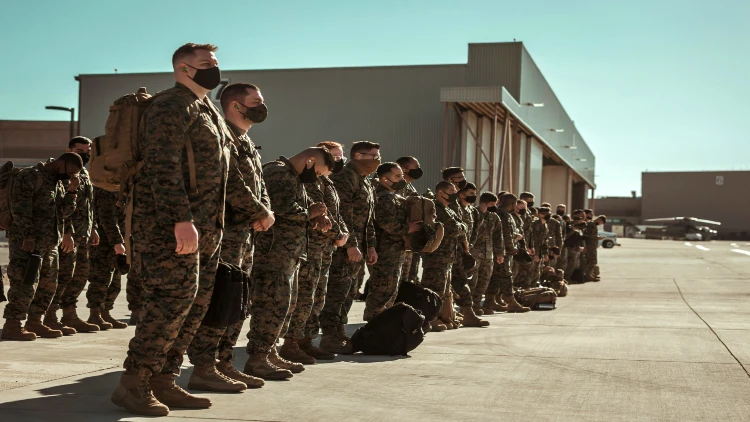
(Image: Joel Rivera-Camacho4)
Each base tends to have slightly different rules around the background check process and some individuals will not have to undergo a full check at all.
However, every individual will need to provide a government photo ID at the base entrance, where the name will be checked in a database to see if the individual has any active warrants or is on a terrorist watchlist.
Generally, only individuals with certain criminal records will be allowed on base. Most individuals with misdemeanor convictions will be allowed to enter the base as well as those with non-violent felonies, or felony convictions that are more than 5 years old.
The practice of performing background checks on individuals trying to gain entrance to a military base is a fairly new practice and the exact process still varies from base to base. When visiting a military base, be sure to have an up-to-date photo ID, and individuals with criminal records should be aware that they may be denied access for security reasons.
What Is Required for an Individual To Access Classified Data in the Military?
Many individuals enlisting in the military may be under the impression that the background check that is performed during the enlistment process grants them access to classified data. However, this is not true as individuals will need a security clearance to access classified information. In order to obtain a security clearance, individuals will need to go through a separate investigation process.
The security clearance process is extremely complex and can take months for the investigation to be completed. Details about how to obtain security clearance and what the process entails is discussed further down.
Army Background Check Requirements
Many individuals wondering what the military background screening disqualifiers are may have something in particular on their criminal history that they are concerned about. Although the background check requirements for the military are fairly strict, only the most serious of crimes can not be overlooked as the U.S. military has processes in place to overlook certain criminal records.
Criminal Record Waiver Military
In many cases, it is possible to obtain a waiver for an individual’s criminal record. If a waiver is granted the conviction on their record that would normally be considered a disqualifier will be overlooked. Not all crimes are eligible for a waiver, but virtually all misdemeanors, most non-violent crimes, and those related to sex or children will be eligible for a waiver.
Besides specific offenses that are ineligible for a waiver, other conditions must be met to be eligible for a criminal record waiver. For example, individuals with extensive criminal records, even if all the convictions were of crimes that would normally qualify for a waiver, will be seen as ineligible. There are also waivers available for individuals who are ineligible due to extensive traffic and misconduct offenses.
There are other enlistment waivers available for issues unrelated to the individual’s criminal record. Certain medical conditions can sometimes qualify for an enlistment waiver as well as certain drug-related and dependency disqualifiers.
Does Military Discharge Appear Background Check?
A military discharge will certainly appear on a military background check. The individual’s military record, if they have one, is one of the things that will be specifically checked during a military background check.
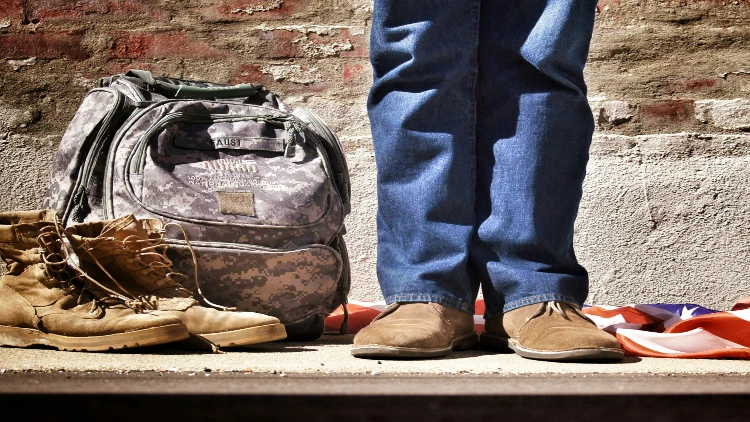
(Image: Benjamin Faust5)
Having been dishonorably discharged previously is one of the most concrete military background check disqualifiers.
Civilian jobs are unlikely to uncover a military discharge. Since most private-employer background checks are performed by private companies that rely on court and law enforcement data, military records are usually not seen as relevant to these databases and will not be searched during the application process.
Does an Other Than Honorable Discharge Show Up in a Background Check?
Who knows what information turns out in a background check? One would like to know: Will other types of military discharge apart from honorable ones appear on a background check?
When it comes to military background checks, if an individual has been previously enlisted in the military, their entire military record will be present during the background check investigation. This will include information from previous investigations, disciplinary records as well as the circumstances of the individual’s discharge.
Will a Military Conviction Show Up on a Background Check?
Military convictions will show up on background checks in some cases but not always. Whether or not it shows up on a background check will depend on what database the information was entered into.
Many military convictions are only recorded in military disciplinary databases. In this case, most private employers will not be checking these databases and will only be looking at civilian criminal databases such as those held by the state police as well as the local courts.
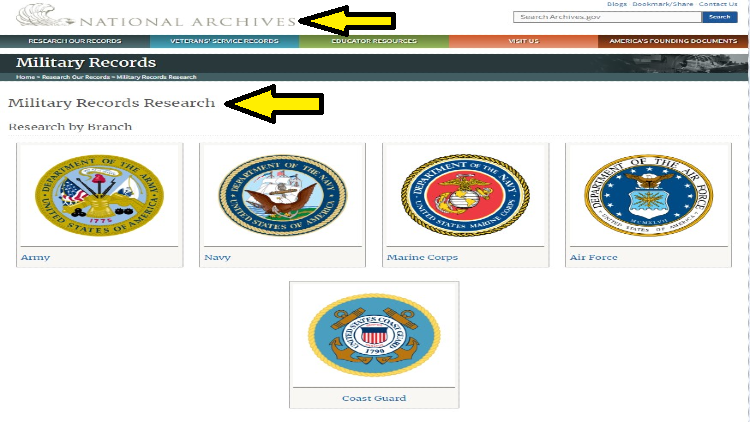
The National Archives contains a military records research section, which veterans can use to access their records.
However, there are a few cases in which this can show up on a background check. The first is if the crime was charged by a civilian court. This is rare and would require a fairly serious crime to be committed while the individual was enlisted. Besides this example, certain background checks for civilian jobs will uncover this information. Most notably, the FBI’s identity history summary check will generally check military records,2 as well as any job that requires security clearance such as jobs with military contractors.
Security Clearance Process
The security clearance process is similar to a background check investigation, but each aspect of the check is taken much more seriously and investigated far more thoroughly.
Generally, the security clearance process will vary slightly based on the level of security clearance that is being requested. The higher the clearance the more thorough the investigation. At a bare minimum, the investigation will include the following checks.
- Identity Verification
- Educational background verification
- Employment verification
- State criminal history check
- Federal criminal history check
- National criminal history check
- International criminal history check
- Extensive reference checks
- Integrity tests
- Trustworthiness checks
- Health-related investigations
- Personal relationship investigations
Although this may not seem that different from what is to be expected from a typical pre-employment background check, many of the checks are performed slightly differently. While a private background check service will perform almost all of their checks by entering a name into a database the background checks for security clearance are often performed by individuals who check this information manually.
This is especially true for reference checks, health and relationship investigations, and integrity tests. Unlike normal reference checks, the reference checks performed during a security clearance check will include thorough questioning of people the applicant has possibly not spoken to in years. This can include old roommates and romantic partners as well as past employers and coworkers. The idea is to uncover information the individual is trying to hide by speaking with people who may not look upon the applicant in a positive light.
The background screening for a security clearance is one of the more invasive background checks at times as investigators will also want to determine if the individual is struggling with substance abuse or if there are extramarital relationships going on in their personal life.
Security clearance background check investigators will also conduct numerous integrity tests to determine the individual’s moral character. These tests usually involve a series of questions with the intent to understand how the individual would react to various moral dilemmas and similar situations.
How To Get a Security Clearance as a Civilian
A common misconception is that only military personnel are able to obtain a security clearance, however, civilians are also eligible to receive a security clearance. Many jobs that require security clearance are jobs with civilian companies that have military contracts. The employees of these companies are not military personnel themselves and instead work alongside military personnel.
The process to obtain security clearance as a civilian is virtually the same as someone who is already in the military.
Security Clearance Questions
The exact questions that are asked during the various interviews and integrity tests will depend entirely on the job that requires clearance. Generally, questions will center around integrity and the way the individual views foreign government as well as their own government.
Top Secret Clearance Requirements
Top secret clearance requirements are fairly similar to the other levels of clearance, only that there are far more restrictions. Virtually any red flag of any kind will be a major hindrance to the ability to obtain top-secret clearance and may result in disqualification.
What Disqualifies You From Getting a Security Clearance?
The exact disqualifications for security clearance will depend on the level of clearance and the job that requires this clearance. In general, any type of dishonesty, no matter how small, will be a reason to deny security clearance. There is a virtually endless amount of disqualifiers but some are more common than others.
5 Automatic Disqualifiers for Security Clearances (Military Background Check Disqualifiers for Security)
Despite the many different reasons that an individual can be denied a security clearance, the following reasons are some of the most common.
- Non-allegiance to the U.S. – Any individual who is not a U.S. citizen will be automatically disqualified from obtaining a security clearance.
- Foreign Preference – Individuals who have exhibited sympathy for a foreign adversary or certain negative views of the United States will be disqualified from obtaining a security clearance.
- Risky Sexual Behavior – Individuals who are having extramarital affairs will be denied security clearance. Not only does this reflect poorly on their integrity, but it also is a security issue as it leaves them vulnerable to blackmail.
- Personal Conduct – Certain personal conduct will be seen as a liability and will result in disqualification. This can be general untrustworthiness or something specific like illicit drug use.
- Poor financial standing – individuals who have serious financial issues such as excessive debt or a recent foreclosure as seen as vulnerable to bribery and are considered too much of a security risk.
Security Clearance Red Flags
There are thousands of potential red flags when it comes to a security clearance investigation. Besides the more obvious ones listed above, many of the red flags will involve the individual’s personal and family life. One of the things investigators will check is the criminal history of friends, family members, and other known associates.

(Image: Carson Masterson6)
Frequently associating with individuals with extensive criminal records or suspicious national allegiances will be a major red flag, even if the individual is unaware of these things.
Security Clearance Denial Rate
The exact denial rate of security clearances will depend on the agency. Generally, the rate is lower than many people would expect. This is largely due to the fact that most individuals who are seeking to obtain security clearance are aware of the requirements and will likely already have worked in a similar industry prior to the application.
Essentially, the pool of individuals under investigation has already ascended to several positions that require integrity and extensive background checks.
Can Family Members Affect Security Clearance?
While most jobs will not even be aware of family members, let alone investigate them, the same is not true for security clearances. Family members and any other associates will be investigated by security clearance investigators both directly and indirectly. Aside from speaking with frequent associates, the investigators are also likely to perform social media and criminal history checks on family members.
Mainly investigators are looking to see who the applicant associates with and whether this could lead to any security issues.
Security Clearance Undocumented Family
Investigators are almost certain to find out if any of an applicant’s family members are undocumented. One way or another this will be a factor in the investigation. How much of an issue this is will depend on numerous factors but the potential threat of foreign influence and personal conduct will be investigated.
Security Clearance Married to Felon
Just like with undocumented family members, the potential issues that arise from an applicant being married to a felon will be investigated. Investigators will always examine possible integrity and security issues. However, this is unlikely to play a major factor.
Cohabitation Security Clearance
During a security clearance, investigators will want to understand the relationship between the applicant and anyone that they live with. This is the primary reason they want to know if the person the individual lives with is a romantic partner or simply a roommate out of convenience. This will help in their risk assessment of the cohabitant.
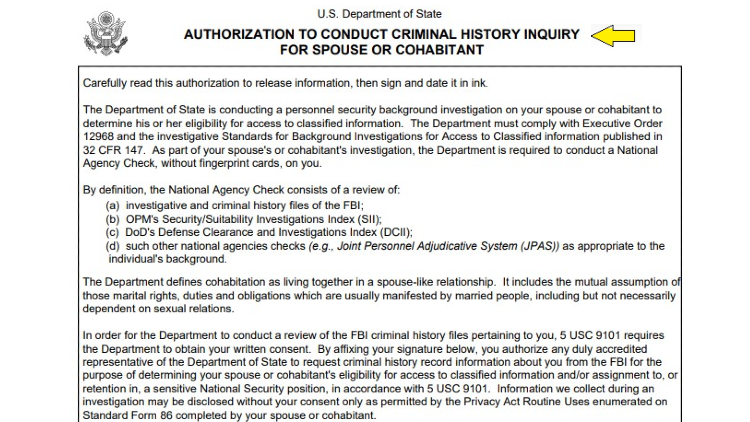
The US State Department outlines how spouse and cohabitation background checks are used when petitioning for security clearance access.
Background check investigations are stressful enough, and security clearance investigations are even more intense. Luckily, it is still possible to be prepared for any security clearance investigation or military background check by being aware of the military background check disqualifiers.
Frequently Asked Questions About Military Background Check Disqualifiers








